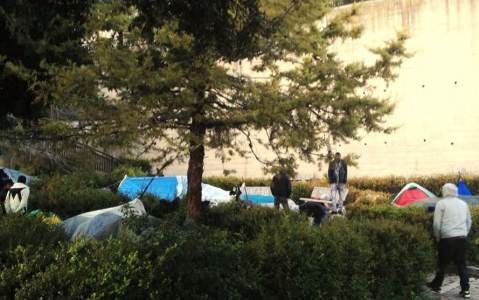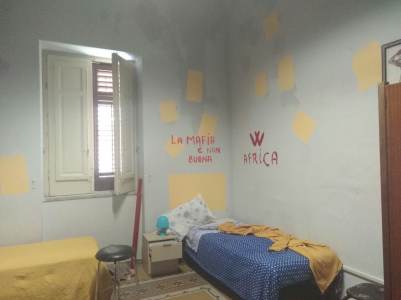Visit to a SPRAR* for minors at Vittoria. How long will you be able to stay in Italy?
Last week, after a brief visit last year, we returned to the SPRAR for minors in Vittoria, in the province of Ragusa. The structure is managed by the cooperative Nostra Signora di Gulfi and comprises an apartment which hosts up to 13 people and a housing unit with 8 places, separated from this, which is reserved for young adults previously housed in the central structure.
We began our visit by being welcomed by the manager of the centre, Noemi Favizza, who described the current sitation to us after showing us around briefly in the building, which we already knew from last year: the house, situated a little way out from the centre of the city, is spacious, with rooms of three or four beds each, a kitchen and a communal living area, a veranda with a laundry room and various offices for the personnel. Everything was extremely quiet, because all the residents were out at the local GREST summer school, with the exception of one who had stayed back at the centre for a doctors’ visit. It was a real shame not to have met them! The hope is that they were actually passing the time in a better way at the summer school, as Noemi said, who emphasized the enthusiasm with which they have accepted this option for the summer. At the moment the centre, opened in April 2014, hosts 6 migrants out of 8 available positions, of ages varying between 13 and 18, the majority being 16 or 17. The guys come from Senegal, Gambia, Bangladesh and Egypt, some arrived around a year ago and others only a few months back. Each has been assigned a tutor, a different one for all except two of the boys, and many have already received calls from the Commission and a permission to remain for 2 years because of humanitarian reasons. Speaking of this, the discussion turned easily to the difficulty of managing with greatest attention to all the different phases of the residents’ processes; often the guys arrive at the court proceedings after months of waiting at a CAS**, without anyone having made the proper formal requests for protection, and therefore it falls to the SPRAR, with the greatest possible speed, to push ahead with all the required bureaucratic processes, for minors already greatly discouraged by the long period of waiting. The SPRAR actually employs 4 educational professionals, a contact person, a health worker, a night worker who works also as a linguistic mediator, and a domestic worker who, as Noemi explains, mainly helps the guys to manage cleaning the house and the kitchen. A social worker, psychologist and a legal assistant are all available at request. Some of the workers speak either English andor French, while the mediator is an indispensable intermediary for the Arab speakers. Every month the migrants receive their 2.50€ daily allowance. “Some of them, the really young ones, ask for help in managing their money which at the beginning all goes immediately on drinks or games. In this case we take the money to the secretary and they give the guy the money whenever he asks for it, trying to educate him also about how to use money. Others manage their pocket money by themselves, even saving it up, perhaps with a view to their project of establishing themselves one day in Germany or elsewhere’, Noemi tells us. The fact that the guys are of different ages and from different countries of origin, with correspondingly different needs, beyond those provided by the procedures of a SPRAR, seems to have occupied much of the team’s work on the individual resident’s projects. ‘Everyone at the centre gets an Italian course, which can start with the alphabet, for those who maybe don’t know how to read or write, or an introduction into everyday language. The guys are enrolled in the evening school in Vittoria, where two of them this year have just got their certificate from middle school. We then made a protocol of agreement with the local job centre to organize instructional work placements and today two of the guys are still following that.’ The socializing activities offered are diverse, from football to trips to the sea, with constant attention to the legal side of things and the documents, which remain the main preoccupation for the migrants.’For us it is extremely important to prepare the guys for the Commission’, Noemi continues, ‘also because its an opportunity to get to know them better and how to interact with them in the best possible way.’ Notwithstanding this, however, it seems there are still many young men here who, as elsewhere in Sicily, leave before their interview or as soon as they find themselves with a document between their hands. ‘Those who move away just after they arrive are usually Somalians, while many of the Subsaharan guys move to Germany or France.’
The domestic worker tells me the same thing when I return a week later to the SPRAR with the intention of visiting the apartment where some of the young adults live who have left the main building. ‘Once, M., who moved to Germany, called me in the night or late evening, because now he works as a night-cleaner. Like him, many others end up in Spain and in other countries and have found cousins and relatives and even work, because here isn’t a place where they want to do that.’ A sad epilogue therefore for those who began the procedures but weren’t able to bear the weight of spending so many years waiting on an uncertain future, even if with document in hand, only to become cannon fodder for the informal labour market and invisible citizens of the world. While we are waiting, the manager and the mediator were in a meeting with a Somalian migrant who arrived at the centre 3 days ago. He walked through the streets of Vittoria from Catania without eating anything for days, when some people stopped him and, as he was a minor, invited him to the SPRAR which was the nearest structure. ‘He wanted to go to Germany by foot and is still very confused. We have explained to him some of his rights and the risks he is taking, but we don’t know what his project is. I think he might leave the centre without saying anything and we’re worried about that.’
An entirely different kind of situation is that of 4 young men in the house for young adults which we visited a little later. The building is new, with four rooms of 2 beds each, thus a total capacity of 8 people, as well as offices, bathrooms, a kitchen and a communal room which faces onto a small veranda. The idea which guided its recent opening is that of making the guys more independent and accompanying them in a more effective manner as they leave the project, working with small numbers. Noemi was present with me and I was welcomed by another worker present in this house, who together with three residents invited me to chat in the sitting room. The guys came from Senegal, Nigeria and Ghana and all three spoke good enough Italian. Two of them have school certificates and are completing instructional work placements as a plumber and as a plastics assembler at nearby companies. I found them in a moment of relaxation, in front of the television, and the more talkative of them, S., proudly told me about his studies and how he continues to hope for a course to become a cultural mediator, which might begin in September. ‘I arrived a year ago in Augusta, and stayed at the school (the ex-school Verdi remained open as a centre of first reception for minors for some months). Since Augusta they sent me to the ‘Zagare’ at Melilli and then here, five months after that. I studied and I have my documents but now I want to do this course to be a mediator because otherwise I don’t know what to do, just sleeping, eating and waiting is no good. And I want to stay in Sicily, because I think in Italy it’s the best place.’ S. listed for me all the languages and dialects he knows, and also told me that he wants to learn German as well. ‘Here among us in this house we speak Italian however. Because we need to learn. It’s also important to speak Sicilian, but Italian first.’
In front of all this determination arose a small amount of hope, but we must ask ourselves how much time these young men will manage actually to stay in Italy living in dignity, as every day we receive the news of other refugees.
Lucia Borghi
Borderline Sicilia Onlus
*SPRAR – Sistema di protezione per rifugiati e richiedenti asilo: protection facilities for asylum seekers and refugees
**CAS – Centri d’Accoglienza Staordinaria: centres for extraordinary reception
Translated by Richard Braude


